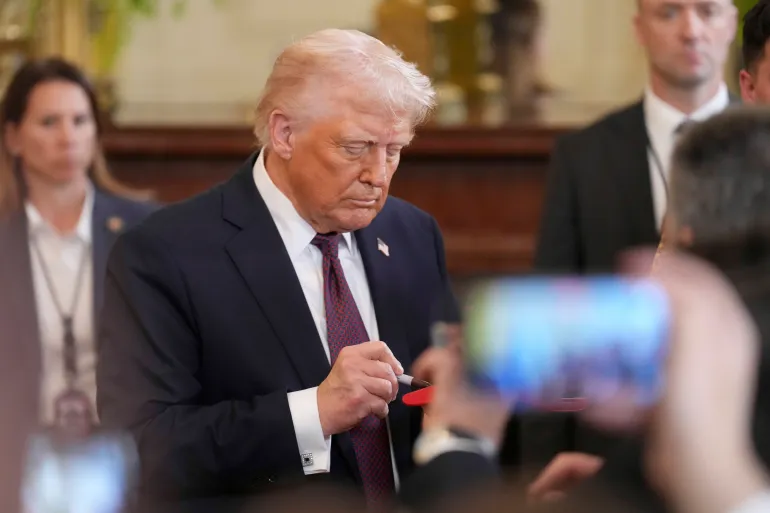- Erosion of Trust in Institutions: Declining public trust in government, media, and other institutions creates fertile ground for authoritarian appeals. Citizens disillusioned with traditional governance may be more susceptible to promises of strong leadership and decisive action, even if it comes at the cost of democratic principles.
- Political Polarization: The deep partisan divisions within the United States have fueled a climate of distrust and animosity. This polarization makes it easier for divisive rhetoric to take hold and for extreme viewpoints to gain traction.
- Misinformation and Disinformation: The spread of false or misleading information online can distort public understanding of political issues and create an environment where authoritarian narratives can thrive. Combating misinformation is crucial to protecting democratic values.
- Economic Anxiety: Economic insecurity and inequality can contribute to a sense of frustration and resentment, making individuals more receptive to populist and authoritarian messages that promise simple solutions to complex problems.
Trump Dictatorship Comment: A Deep Dive into the Controversy
Donald Trump’s recent comments suggesting that some Americans might prefer a dictatorship have sparked a firestorm of debate and controversy. His remarks, however imprecisely stated, have ignited discussions about American political sentiment, the state of democracy, and the potential dangers of authoritarianism. This in-depth analysis will explore the context of Trump’s statement, its implications, and the broader conversation it has ignited.
Understanding Trump’s Dictatorship Remark
The exact wording of Trump’s statement is crucial. It’s important to analyze the precise phrasing used to understand the nuance (or lack thereof) in his message. Was it a deliberate endorsement of authoritarian rule, a cynical political ploy, or a misinterpretation of public opinion? Regardless of intent, the impact of his words is undeniable.
Many have interpreted the comment as a reflection of growing political polarization and a decline in faith in democratic institutions. Others argue it’s a dangerous appeal to anti-democratic sentiment, potentially undermining the foundations of American governance. The controversy highlights the fragility of democratic norms and the constant need for vigilance against authoritarian tendencies.
Public Reaction and Political Fallout
The reaction to Trump’s dictatorship comment has been swift and widespread. Across the political spectrum, figures have voiced their concerns. Democrats have condemned the statement as an unacceptable attack on democracy. Even some Republicans have expressed unease, though many have remained silent or offered muted criticism. The media has extensively covered the controversy, creating a significant public discourse surrounding the issue.
Social media has also played a major role in disseminating and amplifying the controversy. The comment has become a trending topic, generating countless discussions, analyses, and opinions. This widespread engagement underscores the gravity of the issue and its impact on the current political climate.
Analyzing the Underlying Concerns
Trump’s comment taps into several underlying concerns about American society and politics. These include:
The Dangers of Authoritarianism
The potential consequences of embracing authoritarianism are severe. Authoritarian regimes often suppress dissent, limit freedoms, and engage in human rights abuses. The erosion of democratic institutions can lead to instability, violence, and the loss of fundamental rights. It’s crucial to understand the historical precedents and the potential dangers of moving away from democratic governance.
What Can We Learn from This?
Trump’s dictatorship comment serves as a wake-up call. It highlights the importance of protecting and strengthening democratic institutions, promoting critical thinking, and combating misinformation. It underscores the need for robust civic education to ensure citizens understand the value of democratic principles and the dangers of authoritarianism. We must actively engage in political discourse, challenge harmful narratives, and defend the foundations of our democratic society.
Moving Forward: A Call to Action
The controversy surrounding Trump’s remarks should prompt a serious reflection on the state of American democracy. We must all actively participate in safeguarding our democratic values. This includes:
1. Promoting critical thinking and media literacy: Learn to identify misinformation and disinformation, and cultivate the ability to analyze information critically.
2. Engaging in respectful political discourse: Foster open and constructive conversations with those who hold different viewpoints.
3. Supporting democratic institutions: Participate in the democratic process, hold elected officials accountable, and defend the rule of law.
4. Fighting for social justice and equality: Address the root causes of inequality and resentment that can fuel authoritarian appeals.
By actively engaging in these efforts, we can help protect and strengthen American democracy against the threats of authoritarianism.
Let’s work together to ensure that the ideals of freedom and self-governance remain the cornerstone of American society. Share your thoughts on this important issue in the comments section below. What steps do you think are necessary to protect our democracy?

